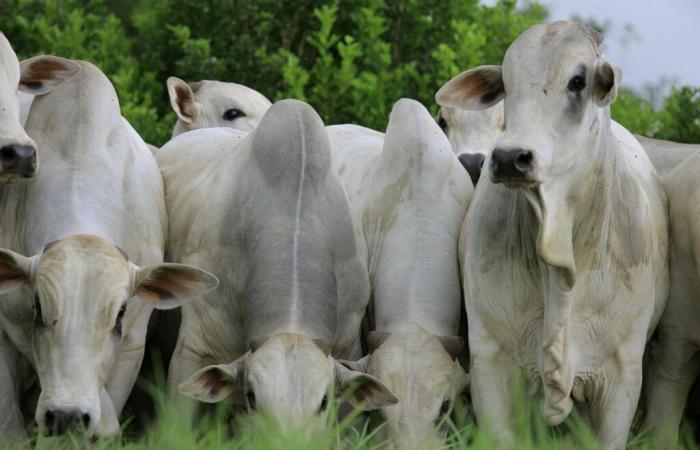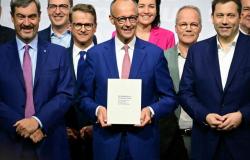One of the pillars of the Brazilian economy and one of the sectors responsible for the highest greenhouse gas emissions, beef production in Brazil, as it is currently practiced, more than double the necessary limit to achieve international environmental objectives. This is one of the conclusions of a study published in the journal Research in environmental sciences and pollution.
The work includes an assessment of projected emission scenarios, as well as an economic assessment. The researchers calculated that emissions in the sector could vary from 0.42 to 0.63 Gigatons de Co2 equivalent (GTCO2e) By 2030, while the limit to achieve the objective of contribution determined at the national level (NDC) would be 0.26 GTCO2e. On the other hand, attenuation strategies along the production chain could prevent losses up to 42.6 billion USD and ensure greater competitiveness.
The NDCs are the commitment that countries made in the Paris Agreement, signed in 2015, and which will be examined this year preceding COP30 (United Nations Climate change Conference) in Belém, in the Brazilian Amazon.
The commitment includes programs reduction objectives for countries, with guidelines to transform the development model, covering all sectors of the economy. The overall objective is to limit the increase in the average temperature of the planet to 1.5 ° C compared to the pre -industrial period (between 1850 and 1900).
This limit, however, is endangered – 2024 was the hottest year in history, with an average increase in global temperature of 1.55 ° C, according to the World Meteorological Organization (WMO).
The study was based on the NDC in force until 2024-a reduction of 43% of emissions by 2030 compared to the levels of 2005. In November, Brazil submitted its new contribution to the United Nations Framework Convention on Climate Change (CCUCC), undertaking to reduce net greenhouse gas emissions between 850 million and 1.05 billion2 Equivalent to 2035 – a reduction of 59% to 67% compared to the 2005 levels.
“We know how important the beef is not only for the economy but also for the Brazilian menu. Our goal is not to say, produce or eat less meat, but start a discussion on the current production of production, which is linked to deforestation, high emissions and without adopting lasting techniques. This is not the way to achieve our climatic objectives.
“Our results show that it is necessary to adopt practices in the production chain that reduce emissions. This also contributes to the reduction of costs associated with climate change, “explains the first author of the article, the biologist Mariana Vieira da Costa, of the economy, health and environmental pollution laboratory (LesPA) at the Federal University of São Paulo (UNIFES) in Brazil.
In their work, the authors used the so-called Social Carbon Social Cost (SCC), a means of quantifying the financial impact of emissions on society and a reference to climate policy and decision-making.
The SCC represents the economic cost of the emission of a ton of CO2Including non -commercial impacts on the environment and human health, and incorporating consequences such as agricultural losses and damage caused by extreme weather events. These costs can be reduced or redirected to investments in more sustainable farming production practices through public policies and accessible credit lines.
According to the study, potential cost savings vary from 18.8 billion USD to 42.6 billion USD by 2030, depending on the objectives.
In 2023, Brazil set a record for beef exports, selling 2.29 million tonnes to 157 countries and generating $ 10.55 billion in sales. Scientists considered the importance of beef exports to Brazil by calculating the quantity available for domestic consumption in 2030 if production was reduced to stay in 0.26 GTCO2He required emission limit to respect the NDC. The result was between 2 and 10 kg of beef per capita (per year).
“I have always wanted to study the relationship between livestock farming and climate change.
For Miraglia, the results are significant because, without significant reduction in greenhouse gas emissions, the increase in global average temperature will lead to additional economic impacts, such as a reduction in agricultural production, an increase in forest fires and an increase in health impacts, including mortality.
Scenario
During a period of almost four decades (1985 to 2022), the Brazil agricultural area increased by 50% to 282.5 million hectares – a third of the national territory. Of this total, 58% is pastures (currently at 164.3 million hectares), according to a study by Mapbiomas, a collaborative network made up of NGOs, universities and technological startups that map terrestrial coverage and the use of land in Brazil.
About 64% of the expansion of agriculture was due to deforestation for pastures (64.5 million hectares). This growth occurred mainly in the Amazon, which caused the biome to go beyond Cerrado (the Savannah type biome of Brazil) in terms of pasture zone.
Scientists highlight the need for synergy between research and rural producers to promote more effective low -emission production practices and seek sustainable environmental techniques and technologies. They also highlight the role that the federal government can play in the brokerage and integration of research and the adoption of technologies by producers.
They point out that although the ABC + plan is currently facilitating investments in intensive practices by breeders, their adoption is still low. The adaptation plan and low carbon emissions in agriculture (ABC +) is a program of the Brazilian government to implement between 2020 and 2030, which ensures the continuity of sectoral policy to combat climate change in the agricultural sector.
In addition to creating and strengthening the mechanisms for the adoption of sustainable systems and practices, he seeks to diversify sources and financial and budgetary instruments.
Costa underlines that the diversification of incentives, such as tax exemptions and the introduction of carbon credits, is essential to stimulate and promote significant large -scale changes in the sector.








